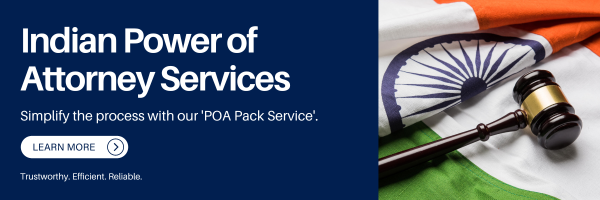In the realm of Indian law, two legal documents play significant roles in managing affairs and planning for the future: the Power of Attorney (POA) and the Will. While both documents involve granting authority to another individual, they serve distinct purposes and operate in different contexts.
Understanding the differences between these legal instruments is crucial to ensure their proper utilization and to avoid confusion or legal complications. This post aims to elucidate the disparities between an Indian Power of Attorney and a Will, shedding light on their respective features, functions, and limitations.
Indian Power of Attorney (POA)
A Power of Attorney is a legal document that confers authority upon a person, known as the “agent” or “attorney-in-fact,” to act on behalf of another individual, referred to as the “principal.” The POA grants the agent the power to make decisions, perform acts, and enter into transactions on the principal’s behalf. We discuss the key characteristics of a POA hereunder.
A Power of Attorney can take two forms: a General POA, which grants broad authority to the agent to handle various matters on behalf of the principal, and a Specific or Limited POA, which confers authority for specific purposes or tasks, such as selling property or managing financial affairs during the principal’s absence.
Revocability: The principal retains the right to revoke or modify the POA as long as they possess the mental capacity to do so. Revocation can be done through written notice to the agent, registration authorities, or by executing a new POA.
Duration: POAs can be either: a. Durable: Remains effective even if the principal becomes incapacitated. b. Non-durable: Becomes void upon the principal’s incapacity.
We cover this in more detail in our recent post – Indian Power of Attorney Explained.

Will
A Will, also known as a “Last Will and Testament,” is a legal document that outlines the distribution of a person’s assets and the appointment of guardians for minor children after their demise. It serves as a crucial tool for estate planning and ensuring that the wishes of the testator (the person making the Will) are honoured. Key features of a Will include:
Testamentary Nature: A Will only comes into effect upon the death of the testator and does not confer any authority or control during the testator’s lifetime.
Executor: The testator designates an executor, responsible for managing the estate, distributing assets as per the Will’s instructions, and settling debts and taxes.
Disposition of Assets: A Will enables the testator to specify how their assets, including property, investments, and personal belongings, should be distributed after their demise.
Guardianship: A Will allows the testator to appoint guardians for minor children, ensuring their welfare and care.
How we can help
Our highly skilled team of professionals has extensive experience in assisting individuals with creating a Power of Attorney for India. We have a proven track record of guiding clients through the process and ensuring successful outcomes. If you are in need of support in this area, we offer our comprehensive POA Pack Service designed to meet your specific requirements.
To discuss your POA with an experienced professional from our team, please call us at +442087575751 or use our contact form.
Frequently asked questions
No, a Power of Attorney ceases to be valid upon the principal’s death. A Will should be used for the distribution of assets after death.
No, a Will only comes into effect after the testator’s death. To grant decision-making authority during one’s lifetime, a Power of Attorney should be used.
Yes, it is common for individuals to have both documents. A Power of Attorney is applicable during one’s lifetime, while a Will is for the post-death distribution of assets.






